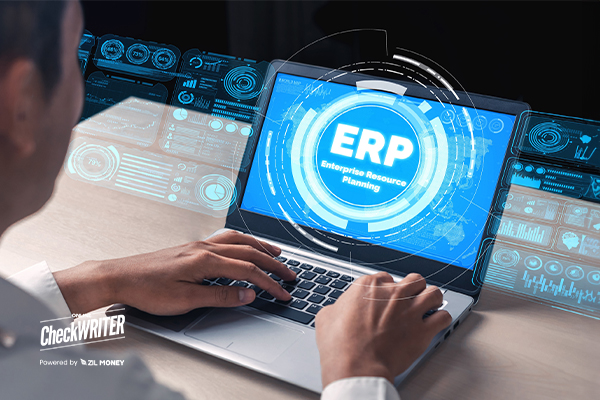ERP systems are essential for automating and connecting different business processes, such as finance, human resources, and supply chains. Yet, today’s complex businesses need more flexibility and immediate access to data. API integration with ERP systems provides this improved capability.
What is ERP?
Enterprise resource planning (ERP) is software that helps businesses manage and improve their operations, processes, and workflows through automation and integration.
Enterprise resource planning systems help manage finances, human resources, supply chains, and manufacturing alongside your main accounting tasks. They also offer clear visibility into your entire business process by monitoring production, logistics, and financial activities.
Enterprise resource planning applications help different departments to efficiently communicate with each other and share information more easily within the company. They gather data about the activities and status of various divisions, making this information accessible to others, where it can be used effectively.
Click Here For Interactive Demo ⬇
How Does an ERP System Work?
ERP systems help businesses run smoothly by gathering, storing, managing, and sharing data across all areas. ERP software brings together various reports and metrics from different departments into one place, providing a complete view of operations and resource usage, including money, staff, and materials.
With real-time data in one location, companies can quickly identify ways to improve processes and allocate resources more effectively, leading to better spending and opportunities for growth. There’s no need for spreadsheets or pulling data from multiple applications; everything is accessible through the Enterprise resource planning system.
Without an Enterprise resource planning system and a solid planning strategy, managing a business becomes much more difficult. Additionally, the company might be underperforming in ways that the management team does not realize.
Why Does Business Need an ERP System?
- ERP automates business tasks across different departments to prevent expensive and unnecessary duplication.
- ERP software combines and simplifies different processes in your business. Rather than relying on multiple systems, an Enterprise resource planning system unifies everything in one location.
- ERPs help you manage your business better by giving you easy access to reliable data from anywhere. With a cloud-based ERP, you only need an internet connection to check important information.
- As your organization expands, handling different task manually becomes burdensome. An ERP system is specifically made to grow along with your company.
What is API and How Does API Integration Benefit ERP?
API means Application Programming Interface. It is a way for two software parts to communicate with each other by using specific rules and protocols.
Enterprise resource planning systems help businesses run smoothly by bringing all data together in one place. But getting and using this data can be tricky and take a lot of time. A good way to solve this issue is by using APIs, which help you pull data from Enterprise resource planning systems and other software.
Benefits of API-ERP Systems Integration
- The integration facilitates real-time data flow between various connected systems.
- APIs enable ERPs to connect with various systems and adapt quickly to evolving business requirements.
- APIs can manage increasing amounts of data and complex integrations as companies expand.
- Most companies are concerned about security breaches when they adopt an ERP system. API integrations built-in security features keep sensitive data safe during transfers.
- APIs in ERP systems allow for highly tailored integrations, aligning your ERP system with your specific business needs.
How the Cloud-Based Platform’s API Benefits ERP
Simplified Payments
Integrating OnlineCheckWriter.com – Powered by Zil Money’s API to an ERP system makes payments easier for businesses. It allows them to automatically create checks, eChecks, and make ACH payments right from their ERP.
Customizable Work Flows
Each organization possesses distinct requirements, making the customization of workflows crucial for enhancing operational efficiency. The cloud-based platform’s API empowers businesses to adapt their financial workflows to suit their individual needs. This includes automating regular payments and more.
Scalability
As companies expand, their financial management requirements change. The platform’s API is built to grow with the business, offering the adaptability needed to manage higher transaction volumes and broader operations.
Easy Integration
In the modern digital world, companies frequently rely on several financial platforms to handle various parts of their operations. OnlineCheckWriter.com – Powered by Zil Money’s API offers integration with various payroll, accounting, finance, ticketing, customer relationship management (CRM), marketing, and application tracking system (ATS) platforms.
Mitigating Fraud
The platform’s API offers tools like positive pay and safe payment processing to reduce fraud risk. When combined with an ERP system, these tools add extra security, making sure all transactions are real and approved.
Positive Pay
The platform’s API offers tools like positive pay and safe payment processing to reduce fraud risk. The positive pay feature makes sure that only checks that are approved can be processed. Businesses need to provide their bank with a list of checks that are allowed. The bank compares this list with all checks submitted for payment. This feature helps protect your account from fraudulent checks.
Enterprise resource planning is essential for the sound functioning of any business. As the complexity of business transactions increases, API integration with ERP helps to tackle the growing complexity easily.







